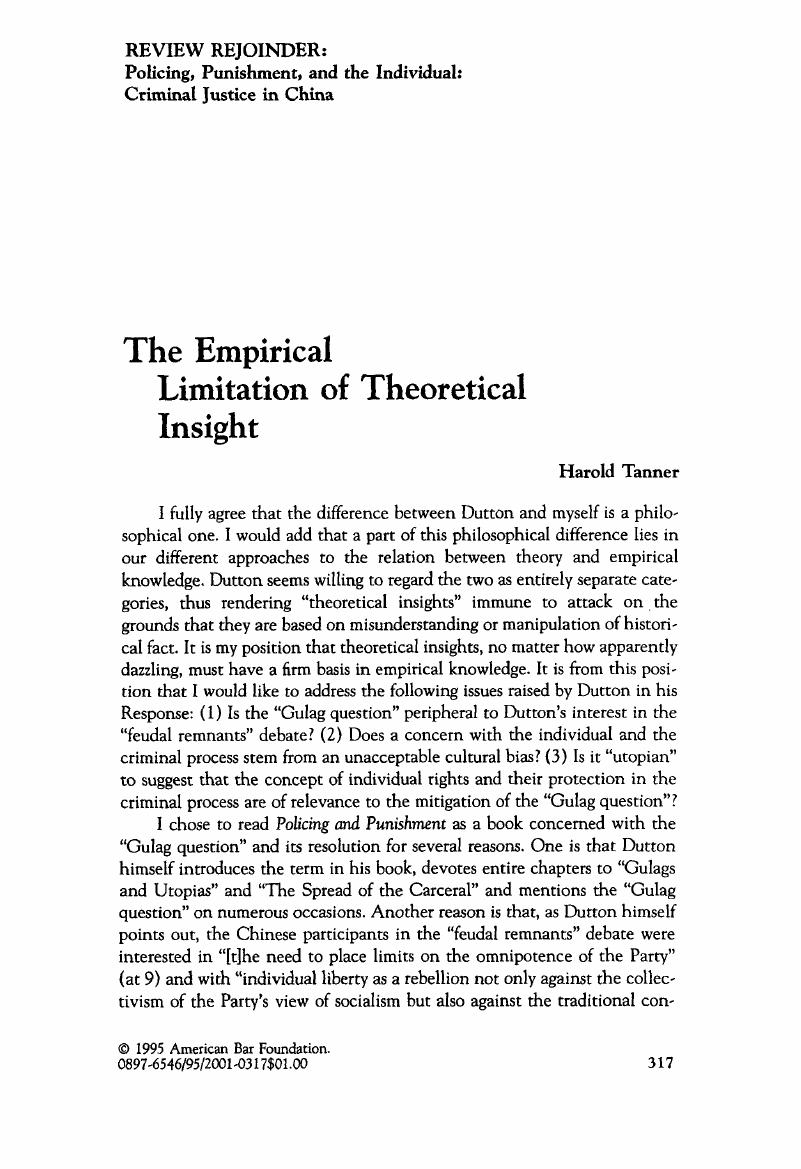No CrossRef data available.
Article contents
The Empirical Limitation of Theoretical Insight
Published online by Cambridge University Press: 27 December 2018
Abstract

- Type
- Review Essay
- Information
- Copyright
- Copyright © American Bar Foundation, 1995
References
1 Sinologists are attacked on pp. 31, 204, 241, and 348 of Policing and Punishment. Google Scholar
2 The function of outsiders in the definition of Chinese racial identity has been discussed in Frank Dikotter, The Discourse of Race in Modern China (Stanford, Cal.: Stanford University Press, 1992). Parenthetically, I would disagree with Dutton's interpretation of the appellation “Old Foreigner.” Even as a term of endearment, it underlines the difference between “us” and “them.” Also, as with many epithets applied to other nationalities, the significance of the term varies with context, including the place and the intention of the person who utters it. A child on the bus telling her mother “Old foreigner” and a group of young men in leather jackets at night in an abandoned marketplace shouting “Old foreigner!” plus a few choice swear words are two entirely different things.Google Scholar
3 For example, see Susan Brownmiller, Against Our Will: Men, Women and Rape (New York: Simon & Schuster, 1975); Tim Beneke, Men on Rape (New York: St. Martin's Press, 1982); Catherine MacKinnon, Toward a Feminist Theory of the State (Cambridge, Mass.: Harvard University Press, 1989).Google Scholar
4 For a discussion of procedurat aspects of traditional Chinese law, see William P. A1-ford. “Of Arsenic and Old Laws: Looking Anew at Criminal Justice in Late Imperial China,”72 Cal. L. Rev. 1180(1984).CrossRefGoogle Scholar
5 See the discussion in Karen Turner, “War, Punishment, and the Law of Nature in Early Chinese Concepts of the State,” 53 Harv. J. Asiatic Stud. 285, 322–24 (1993).Google Scholar
6 Id. at 324. Turner also observes that contemporary Chinese legal historians as well as Western historians of Chinese law have actively searched the Chinese past for evidence of the institutional limitation of the abuse of state power in order to provide historical bases for the introduction of stricter procedural law into the legal system of the People's Republic of China. Id. at 290–91.Google Scholar
7 “Zhonghua renmin gongheguo xingshi susongfa cao'an (chugao)” (Draft of the Criminal Procedure Law of the People's Republic of China (First Draft)) (hereafter “Draft”) in Xingshi susongfa cankao ziliao, diyiji (shangce) (Reference Materials on the Criminal Procedure Law, Vol. 1, No. 1) 50 (Beijing: Beijing zhangfa xueyuan susongfa jiaoyanshi, 1980). The text of the Draft is dated 10 April 1963.Google Scholar
8 Criminal Procedure Law of the PRC, in The Criminal Law and the Criminal Procedure Law of China art. 29 (Beijing: Foreign Languages Press 1984) (“PRC Crim. Proc. Law”); Draft art. 28.Google Scholar
9 PRC Crim. Proc. Law arts. 31, 32, 35; Draft arts. 30, 31, 32.Google Scholar
10 PRC Crim. Proc. Law art. 137.Google Scholar
11 For example, see the essays in John P. Clark, Dean G. Rojek, & Ronald J. Troyer, eds., Social Control in the People's Republic of China (New Yark: Praeger, 1939). It is noteworthy that these “revisionist” scholars appear not to speak or read Chinese: they rely entirely on openly published English-language sources and on their observations made during several short, officially arranged guided academic tours to China. This seems to have facilitated their tendency to idealize the Chinese approach to social control in order to “find” in it soiutions to the admittedly serious problems of the American criminal justice system.Google Scholar
12 John Braithwaite, Crime, Shame and Reintegration 11 (Cambridge: Cambridge University Press, 1988).CrossRefGoogle Scholar
13 Id. at 158.Google Scholar
14 In this context, I might note that Chinese scholars do in fact view rites and law as having been so close as to have been, at some points, virtually indistinguishable. Zhang Jinfan, Lin Zhong, and Wang Zhigang describe rites as being both a source of ancient Chinese law and an important component of that law. For instance, they describe the rites of Zhou as “having the charactaristics of the fundamental law of a slave state.” Zhang Jinfan, Lin Zhong, & Wang Zhigang, Zhongguo xingfashi xinlun (A New History of Chinese Criminal Law) 30–31 (Beijing: Renmin daxue chubanshe, 1992). Another scholar, Liang Zhiping, states: “[T]he Rites of Zhou were not merely the trivial rules of everyday life; at the same time they were, more significantly, the standards by which the state was ruled.” Liang Zhiping, “Cong 'li ru yu fa' kan zhongguo gudai falu” (Ancient Chinese Law from the Perspective of “Conhcianization of the Law”), 1 Wenshi zhishi (Knowledge of Literature & History) 88 (1987).Google Scholar
15 Wang Ge, “Dangqian nongcun shehui wenti yu shehui guanli wenti jianxi” (Analysis of Current Social Problems and Questions of Social Management in Rural Areas), 5 Shehuixue yu shehui diaocha (Sociology & Social Investigation) 30 (1988).Google Scholar




